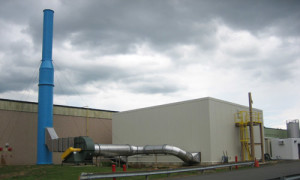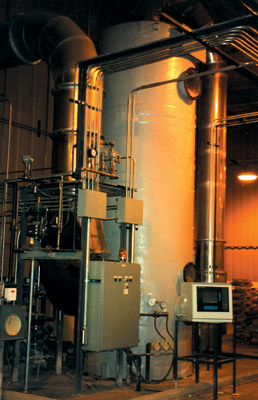Ambient Engineering
Industrial Waste Gas Treatment
Ambient Engineering is a full service provider of air pollution abatement solutions and services. Areas of expertise include:
- Design, construction and installation of equipment/systems.
Treatment and control of volatile organics, odor emissions, acid gasses, HAPs, and particulates. - Inspection, refurbishment and/or upgrades of existing installed systems including packing, demisters, pumps, sensors, blowers, and other components as needed.
- Consulting and implementation of NJDEP/USEPA pre-construction permits, emissions statements, mass balances, agency interface, CEMS evaluation/avoidance.
- Generation and filing of air permits and environmental forms: CRTK, TRI, RPPR, TCPA, SPCC, DPCC, SPPP, DRBC sampling and MP
- Provision of on-site training and operating manuals.
- Annual Environmental Consulting Programs to assist clients in maintaining regulatory compliance.
AMBIENT ENGINEERING
Biofiltration Systems
Ambient Biofilters are currently treating approximately 250,000,000 cubic feet per day of process waste gas from a variety of sources, and meeting permit requirements. Biofiltration is the preferred technique for treatment of emissions from food processing, composting, flavor and fragrance production and numerous other odor causing activities as well as low levels of VOC. Our filter medium has been proven to last at least 20 years without requiring replacement, when normal monitoring activity is routinely practiced. If your application is conducive to biofiltration we can design a turnkey system that is fully automated. If biofiltration is not indicated, we can offer an appropriate alternative, such as packed bed scrubbing or fixed bed absorption and regeneration.
Regenerable Fixed Bed Absorption
A recently developed technique using a fixed bed adsorption medium is a viable alternative to fixed carbon beds, RTO’s or other controls. The medium has a higher effective surface area than carbon, is advantageous in humid gas streams wherein carbon will lose substantial capacity, can tolerate higher linear flow rates, and is not an explosion or fire hazard. The beds are alternately regenerated in situ without a fuel/high temperature sources, eliminates the need for down time and the time and costs associated with carbon replacement. Additionally, since there is no combustion source, permitting and monitoring are eminently simpler than required for an RTO.
Packed Bed Scrubbers
For decades Ambient Engineering has been custom designing and installing packed bed scrubbers for a multitude of applications including acid gasses and odor. Many of our scrubbers have been operating 24 hours a day, 7 days a week for over 30 years. Single stage, multiple stage, or in combination with other controls, custom design and installation as well as downstream service and monitoring is our specialty. We are always available to clean and service our or other’s units, including component specification up-grading and replacement. Automation of chemical feeds and controls are routinely provided.
Venturi scrubbers
Venturi scrubbers are used primarily for particulate emission control when the particulate is such that it would plug a baghouse (fabric filter) or when the particles are water soluble. The Venturi Scrubber operates on the principal of impaction and agglomeration. Liquid is added to the gas stream at the venturi inlet and accelerated to a high velocity in the Venturi Throat. At this point, it’s forced into intimate contact with the particulate and gaseous contaminants, increasing the mass and momentum of the particles. The now-wetted particles are impacted on the flooded elbow and walls of the attached spin-out chamber where they drain into the sump. Ambient Venturi scrubbers can be designed for a wide range of flow rates and are effective down to the low micron range. Venturi throat sizes are optimized for your specific application. Where the gas flow rate can vary significantly Ambient can design a variable throat Venturi scrubber
Cyclone separators
Cyclones are primarily used when the particulate emissions are dry and larger than 10 microns in size. The advantage of a cyclone is its relatively low capital cost and small footprint, the fact that it can handle high temperatures and with the right design, abrasive materials. The maintenance requirements on a cyclone are minimal with no bags to replace and no moving parts with the exception of the rotary airlock. The disadvantage of a cyclone is the low collection efficiency of particles less than 10 microns or light “fluffy” particles.
The Cyclone operates utilizing a vortex and gravity to remove particles from the gas stream, in fact in a reverse cyclone two vortices are created, an outer vortex which impacts the particle against the cyclone wall an an inner vortex, which spins in the opposite direction and exhausts through the Cyclone outlet
Ambient Engineering has designed and installed it’s Multiclones on chaff collection systems for coffee roasters, with zero visible emissions from the cyclone. Although the particles are light, there was sufficient mass to separate the particles from the gas stream. Cyclones can also be used as a pre-filter, to reduce the loading on a baghouse (fabric filter) resulting in longer bag life and cleaning cycle.
Cartridge and Fabric Filters
Cartridge and Fabric Filters (Baghouses) are the workhorse of particulate control. The advantages are dry collection of particulate emissions, high collection efficiencies even on submicron particulate and relatively low pressure drop pressure drop (less H.P.) when compared to other particulate controls. With the proper filter bag material and pre-coat the baghouse can be used in many applications including Flue- Gas Desulfurization (FGD) and reduction of Mercury emissions. Ambient Engineering has the expertise to design a system for most applicable operations including asphalt fumes from a roof shingle manufacturer. Important to keep in mind, is that Cartridge and Fabric Filters are not sized strictly on the air volume (acfm) but also on the type and size of particulate collected. Knowledge of the operation is required in order to determine the correct air to cloth (A/C) ratio. A Baghouse that was used to handle a certain airflow in one operation, may only be able to handle one half the flow, and operate efficiently, in another operation. Experience is Ambient Engineering’s specialty.
Ductwork Design and Installation
Ambient Engineering has been assisting clients with design, fabrication, and installation of gas collection and conveying systems, from production floor or process unit pick-ups, fume hoods, oven exhausts, stack vents, complex and multi-point collection systems, or other unit process or plant wide systems, including ID or FD blowers and sensors, and controls. Spiral wound, straight wall, galvanized, stainless steel or other design and material of construction ducting is chosen for optimum performance. Experience gained from innumerable projects and process conditions enable us to design systems of maximum efficiency, and lowest pressure drops and power consumption.


